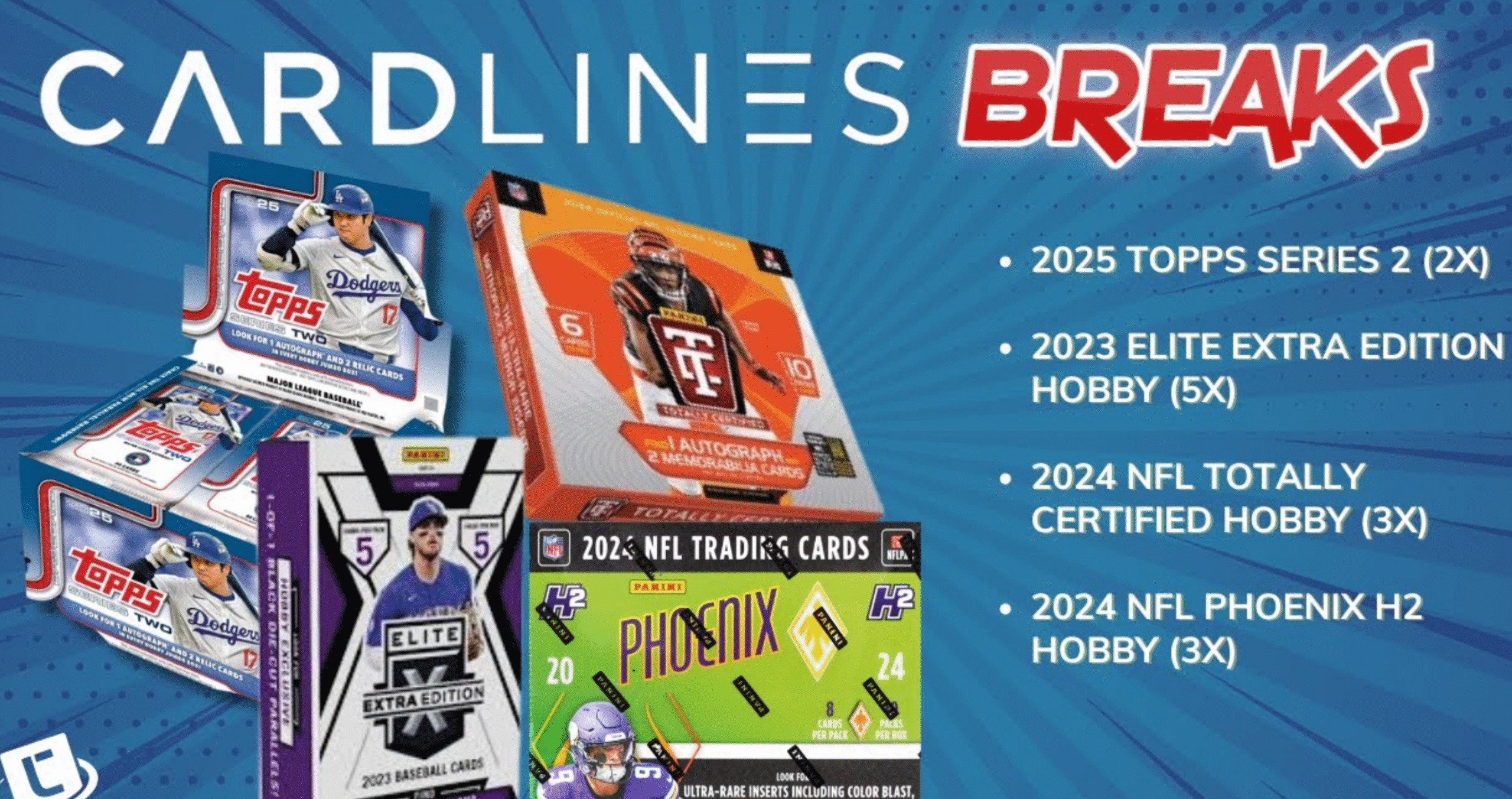

Sports card breaking has moved from the periphery of the hobby to its center, especially over the last two years. We have seen a lot of evidence of that recently. After becoming the main moneymaker for most card sellers, it finally broke through into mainstream media.
Coverage by ESPN with an in-depth feature is a watershed moment for the profile of breaking. Big corporations like Fanatics and eBay seem determined to get a piece of the action.
Meanwhile, there have been several moves to regulate the wild space of breaking. What does this all mean? Are these promising developments or not? More in our overview of how sports card breaking has gone mainstream.
Before sports card breaking went mainstream, it had a quaint beginning. Apparently, The first breaker was Rick Dalesandro, known as Dr. Wax Battle. He still runs a card shop at 3400 Route 37E, Toms River, New Jersey. However, he never really focused on breaks but integrated them into his YouTube show in the mid-2000s.
Since the break was just a small part of the show, they were recorded rather than streamed live. That looks positively quaint today when sports card breaking has become such a massive business.
Where did I learn this? On June 27, 2023, ESPN published an article by Ryan Hockensmith titled “The controversial rise and uncertain future of box breaks.”
Although the writer does not fully understand the hobby, the piece is well-written and worth reading. The ESPN article traces the roots of the mainstream breaking phenomenon to one particular break when Layton Cards pulled a 1/1 Luka Doncic in a break of Panini 2018-19 Prizm.
A card that is probably worth over one million dollars at this point. It looks at some of the challenges facing breakers today. It ends with a wonderful description of how breaking changed Rich Layton’s (the owner of Layton Sports Cards) life.

The breaking industry generates the majority of income for some card shops. The aforementioned Layton Cards is an excellent example of that. According to the ESPN article, 90-95% of the sales of that card shop come from breaks.
The article nicely described that enterprise: “Layton’s shop now is the epitome of what most big-time card businesses have become, which is more like a pricey digital art gallery than a brick-and-mortar sliver of a strip mall.”
For several years, even as sports card breaking turned into a massive business, there were no meaningful regulations on the industry. But it seems like we are at a turning point in this regard.
Why is this happening? By most criteria, sports card breaking is a form of gambling. According to federal law, gambling is defined as “accepting, recording, or registering bets, or carrying on a policy game or any other lottery, or playing any game of chance, for money or other thing of value. And according to Title 18, U.S.C., Sec. 1955, engaging in an illegal gambling business is a federal crime.
Then add to that the fact that every state has its own unique gambling laws and bylaws. Indeed, it is still entirely illegal to gamble in Utah and Hawaii. But it doesn’t end there. Even in states where gambling is legal, many online gambling activities are considered illegal.
People have been prosecuted and convicted of engaging in illegal gambling, usually as misdemeanors. However, when the sums are large enough, it can be considered a felony.
Then, of course, there is the question of taxable income. Gambling proceeds are treated differently than payment for goods and services. And that is assuming breakers are properly reporting their earnings. There are almost certainly some breakers who are not doing so.
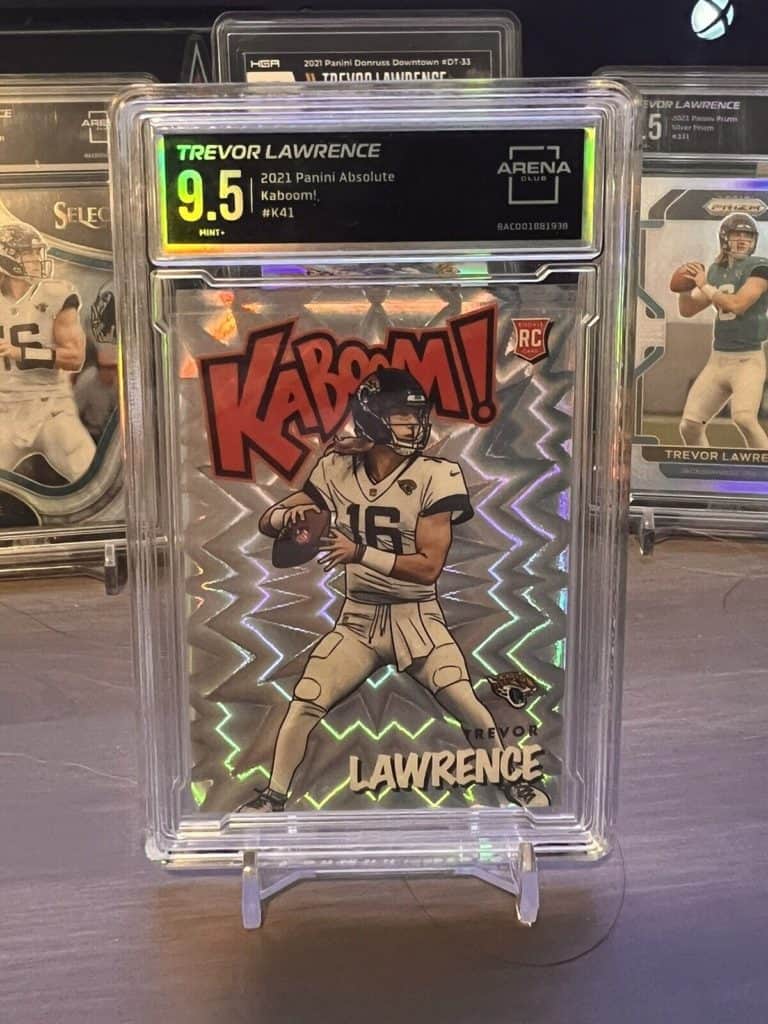
You may be thinking sports card breaking isn’t really gambling. It’s more like a raffle, and those are legal. Well, yes, hypothetical reader. Raffles are indeed legal. But only under specific conditions. It is illegal to require the purchase of a product as a necessary condition for entering a raffle. They are allowed only as a means of driving up business and not as a way to make a profit directly off gambling.
Therefore, you are allowed to link a raffle to buying a product. But you can’t make it mandatory. If you look at card boxes, you will often see that you can enter giveaways by sending in an entry form. That is a way of making sure they are not violating the law. But of course, sports card breakers are not in the habit of giving away free entry to their breaks.
So, you can see that breakers are in a realm of legal uncertainty. Some would say, in a position of legal peril. Adding to that, breakers have been involved in a series of scandals that have raised doubts about the format.
As sports card breaking went mainstream, more money than ever was involved. Not surprisingly, it has attracted some shady actors. Unfortunately, some of them have become massive players on the scene.
Particularly notable in this regard is the Backyard Breaks outfit. They first came to our attention when they promised to give away a Trevor Lawrence Gold Kaboom! and then kept it, claiming they donated the proceeds to charity.
The outfit has recently been accused of withholding another highly valuable card. This time a Giannis Antetokounmpo auto rookie card. In addition, there have been some accusations that they are receiving marked boxes from Panini.
Other actors in the breaking world have also been involved in questionable behavior. The owner of Platinum Breaks attacked one of his employees with a box cutter. They also very clumsily tried to hide a big card, a Justin Fields redemption, in a maneuver that was caught on camera.
While most breakers are doubtless honest, the existence of bad actors has raised all sorts of questions. The more money came into breaking, the more problematic the general lawlessness accompanying that space. Therefore, it was unsurprising when some of the most prominent actors in the hobby moved to regulate this space.
It started when PayPal changed its terms and conditions to crack down on breaking. PayPal did not allow gambling and changed its criteria to forbid:
“Games of chance and games of skill – Includes any activity with an entry fee and a prize, regardless of whether the outcome is determined by chance or skill.” In other words, even if the law does not see sports card breaking as gambling, PayPal does. And, of course, PayPal is one of the most accepted and popular payment services in the hobby.
It is worth noting that they do not mention sports card breaking by name. However, starting in February 2021, breakers began reporting that PayPal was no longer allowing them to accept payments for breaking. In some cases, they were even banned, receiving a message that “we’ve determined that you are in violation of Paypal’s acceptable use policy.
Specifically, unapproved activities involving gambling, gaming, and/or any other activity with an entry fee or prize.” It then stated that was a result: “your account has been permanently limited, and you won’t be able to conduct any further business using PayPal.”
And in addition, the users banned in this manner were not allowed to use the credit card or banking information involved to start a new account. It gets worse, though, because those breakers had a balance, “we’ll hold it for up to 180 days. These funds may be used to satisfy any obligations you may have under the User Agreement and Acceptable Use Policy, including potential liabilities to third parties and Paypal for EACH violation of the Acceptable Use Policy, including liquidated damages.”
And indeed, some breakers reported that their finds were not returned. The grounds PayPal used for that was the following clause in their user agreement:
“You acknowledge and agree that $2,500.00 U.S. dollars per violation of the Acceptable Use Policy is presently a reasonable minimum estimate of PayPal’s actual damages considering all currently existing circumstances, including the relationship of the sum to the range of harm to PayPal that reasonably could be anticipated because, due to the nature of the violations of the Acceptable Use Policy, actual damages would be impractical or extremely difficult to calculate.”
PayPal may deduct such damages directly from any existing balance in any PayPal account you control. Let this be a reminder, don’t leave a surplus of funds in PayPal. You may live to regret it.
Back in March 2023, TikTok severely limited the ability of breakers to use their platform. A statement from the company explained:
“While surprise-based products can be sold, they are currently restricted on our platform. This means that sellers who wish to sell or promote such products must abide by our TikTok Shop Gambling, Gifting, and Surprise-based Product Control Guidelines.”
These guidelines include the following clause: “Surprise Trading Card Packs” and now require any presenter (e.g., card breaker) to sell any baseball cards in “the manufacturer’s original packaging and content without any alterations. All sold product(s) must also be sealed.”
It was always a matter of time before measures of this sort were taken.
After all, sports card breaking is a form of gambling, and that space has always been heavily regulated in the United States. It was just a matter of the power catching up to a phenomenon that started as subversive and became mainstream.
The world is becoming more aware of sports card breaking, and large corporations are acting to regulate or ban it. Therefore, it would not be a massive surprise if law enforcement also started to take an active interest in these activities.
On June 15, 2023, eBay sellers received an email from the e-commerce corporation:
“The eBay trading cards community is filled with dedicated enthusiasts and fans looking to buy and sell in this category. With the growing popularity of case, box, and pack breaks, we’re taking steps to allow sellers and buyers to participate in these live events. Effective July 18, 2023, pre-approved sellers may only sell case, box, and pack breaks. Any live auctions underway can be completed, but after July 18, you’ll no longer be able to start new break listings.
Sellers who have been pre-approved to sell live breaks will be contacted directly. We’re continuously working to support our trading card sellers. We’ll reach out if future opportunities open up for selling cases, boxes, and pack breaks. Thanks for being part of the eBay community.”
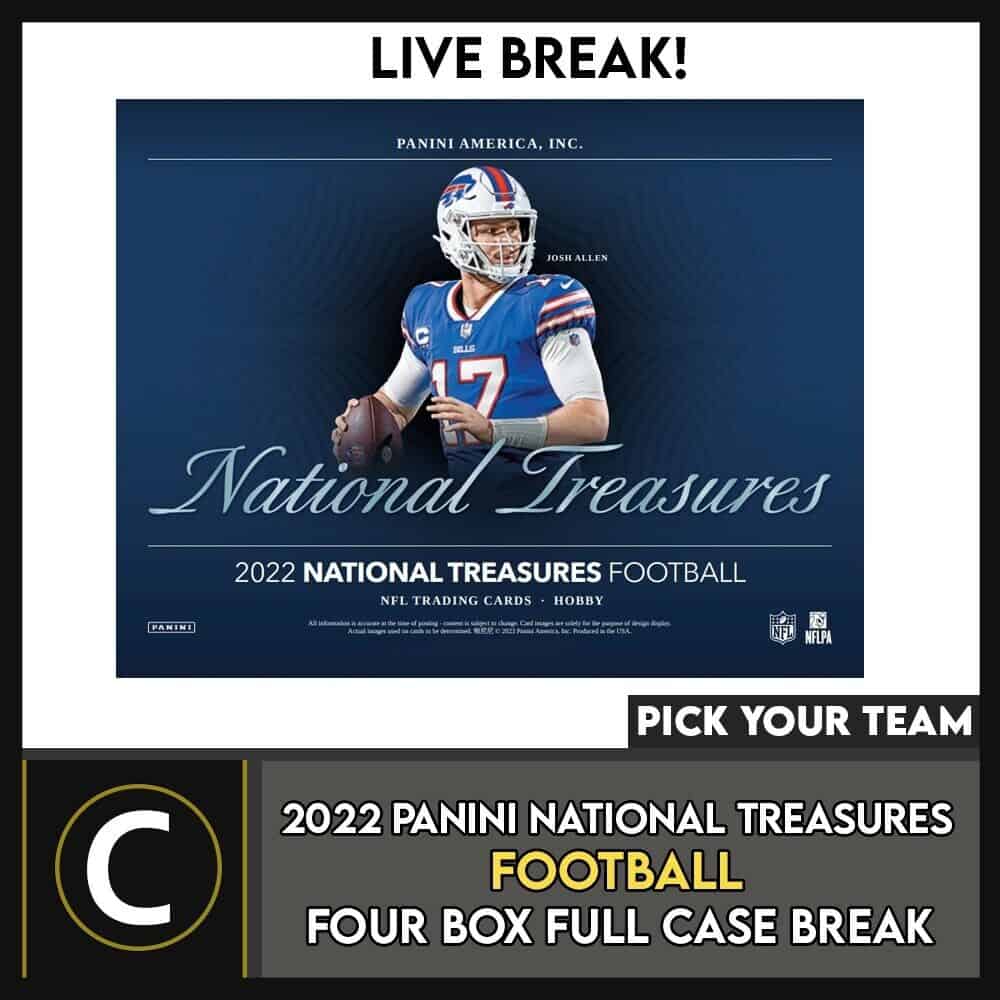
At first glance, eBay offers an exciting opportunity with this message, allowing breakers to hold their breaks on the platform. And some exciting developments in that regard may have yet to be announced. However, that is not the main message here.
After all, countless spots in breaks have been sold on eBay over the last few years. What is new is not the possibility of selling break spots on the e-commerce platform. Instead, it is cracking down on that ability and will only allow a select few to participate, at least for now.
Who are the chosen ones allowed to run their breaks on eBay? Right now, we do not know. The message behind the email appears to be that there is no method for application, at least not yet.
Instead, eBay promises: “Sellers who have been pre-approved to sell live breaks will be contacted directly.” We imagine sellers with stellar reputations and good customer feedback are first on their list.
Sports apparel, and now sports card giant Fanatics, also took measures recently in this space. As we reported here recently, the company seems to be prohibiting brick-and-mortar card shops from holding breaks online. According to newly released retailers’ terms and conditions:
“Products purchased through an account are for distribution through the store(s) identified in the account information attached hereto only. For clarity, products are for resale directly to consumers in physical retail, brick-and-mortar environments only, in their original, unopened form -i.e., no business-to-business sales unless otherwise agreed by Topps in writing. Retail shall not use its accounts for personal shopping, and products shall not be used for repacks unless authorized in writing in advance.”
“Retailers may use products for in-store breaks, provided that; breaking slots may not be sold or solicited online or to anyone not present in the Retailer’s store at the time of the break.” They ended that clause with the warning: “Any account found noncompliant with the foregoing may be terminated immediately.”
Sports card breakers are feeling pressure from all sides. They have fewer places to break and sell spots, with TikTok and eBay placing limits. Meanwhile, Fanatics may make it impossible for card shops to break. Does that mean we will see breaks happening less?
I doubt it. The hobby loves breaks. Even those of us who grumble about all the problems with it, like myself, still partake in breaks when the right product comes out. There is no other way most of us are getting a chance at big cards in high-end products like Flawless and National Treasures. And it has brought a ton of money and new people into the hobby. It is going nowhere.
We may see sports card breaks occur in fewer places. But we will probably not see less money in that field. The prominent players in the hobby, like Fanatics and eBay, are not trying to take sports cards breaking out of the hobby. They are merely moving to assert complete control over a very profitable enterprise. So they will do their best to squeeze out smaller players and keep all the profits to themselves.
What about the legal challenges? Will they put an end to sports card breaks? I seriously doubt it. There are many precedents for what is happening now in the sports card breakers space. Think of gambling.
That used to be the province of shady bookies who would break your leg for lagging in payment. Or maybe they just did that in the movies. But either way, once big corporations started to move into the gambling space, the illegal aspect was weakened.
Law enforcement focused on prosecuting smaller shady actors, while the corporations got lawyers and lobbyists to ensure they cornered the market. The same thing happened with movie and music piracy and the cannabis business. That is what we are seeing now with breakers.
Something is happening in the breaker space. It no longer feels like card breakers operate in a vacuum outside the law. The many regulations in this space and the ESPN feature reflect a fundamental change in the hobby. There is no question that sports card-breaking has gone mainstream.
Paradoxically enough, as sports card breaking becomes a more significant business, those engaged in it feel more insecure than ever. We have to put this anxiety into context. The primary trend we have seen in the hobby over the last three years is the concentration of power and wealth in fewer hands.
Fanatics, P.S.A. and eBay, have emerged as power players gobbling up everything else. That has left small to medium-sized card sellers feeling insecure about their place in the hobby. Indeed, with these big companies trying to take control of the entire process from card production to distribution, the future of the local card shops and the smaller eBay sellers is in doubt.
what was Panini doing? 🙄
I compared sports card prices from the big sellers to save YOU money
Is GameStop buying PSA? (the truth!)
I ripped an entire case of Phoenix Football (BIG win or MASSIVE loss?)
Make an extra 30% PROFIT on eBay with this sports card hack
What's your biggest trading card regret? This is a safe space. 🤣
I used ChatGPT to invest in sports cards (and make this thumbnail lol)
Easy hack for buying Tyrese Haliburton rookies at a DISCOUNT.

BCW Thick Card Toploaders 197 Pt. 10 per pack

BCW Thick Card 59 Pt. Toploaders. 25 per pack

BCW 20 Pt. Toploaders. 25 per pack
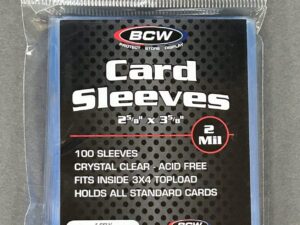
BCW Standard Card Sleeves. 100 per pack
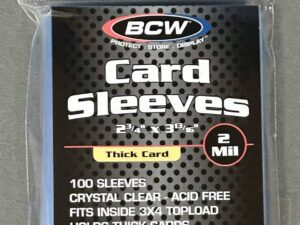
BCW Thick Card Sleeves. 100 per pack
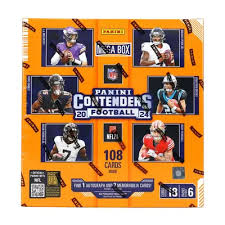
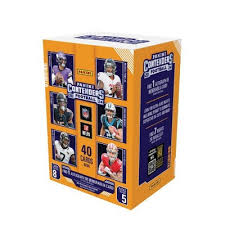
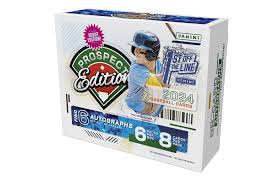
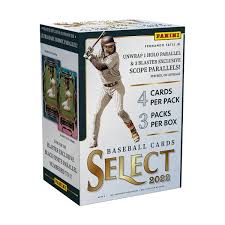
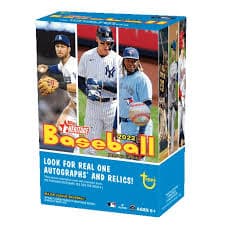
2022 Topps Heritage Baseball Blaster Box Configuration: 7 Packs per Box – 9 Cards per Box. Plus 1 extra pack.
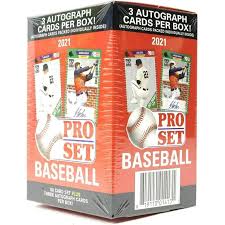
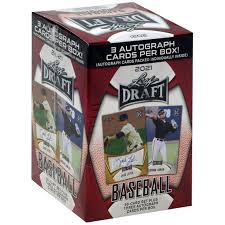
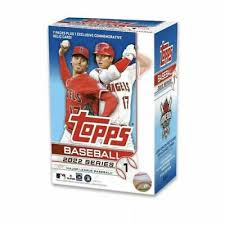


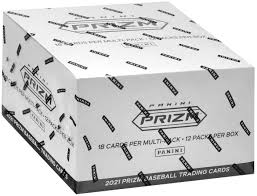

© Copyright 2025 - All rights reserved Cardlines.com / Media Techs LLC - Sports Card News, Reviews, Releases and BREAKS - #thehobby.
Important: When you click on links to various merchants on this site and make a purchase, this can result in this site earning a commission. Affiliate programs and affiliations include, but are not limited to, the eBay Partner Network.
The SAD story of Collectable. What went wrong? (The Downfall Fractional Sports Card Investing)
Cardlines June 18, 2025 3:00 pm